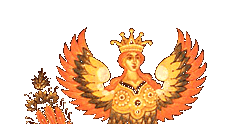After Oleg's death, Igor became the ruler of Russia. He was neither successful in his military enterprises nor popular with the people. A campaign undertaken by him against the Slavic tribe of Derevlians, who lived between Kiev and the present-day Polish border, resulted in his husband. Folklore motifs are evident in this story of her revenge, which is one of the most colorful narratives of The Tale of Bygone Years.
6453 (945) In this year, Igor's retinue said to him: "The servants of Sveinald are adorned with weapons and fine raiment, but we are naked. Go forth with us, O prince, after tribute, that both you and we may profit thereby." Igor heeded their words, and he attacked Dereva in search of tribute. He demanded additional tribute, and collected it by violence from the people with the assistance of his followers. After thus gathering the tribute. I shall turn back, and rejoin you later." He dismissed his retainers on their journey homeward, but being desirous of still greater booty, he returned on his tracks with a few of his vassals.
The Derevlians heard that he was again approaching, and consulted with Mal, their prince, saying: "If a wolf comes among the sheep, he will take away the whole flock one by one, unless he be killed. If we do not thus kill him now, he will destroy us all." They then sent forward to Igor inquiring why he had returned, since he had collected all the tribute. But Igor did not heed them, and the Derevlians came forth from the city of Izkorosten in Dereva even to this day.
But Olga was in Kiev with her son, the boy Sviatoslav. His tutor was Asmund, and the troop commander was Sveinald, the father of Mistisha. The Derevlians then said: "See, we have killed the Prince of Russia. Let us take his wife Olga for our Prince Mal, and then we shall obtain possession of Sviatoslav, and work our will upon him." So they sent their best man, twenty in number, to Olga by boat, and they arrived below Borichev in their boat. At that time, the water flowed below the heights of Kiev, and the inhabitants did not live in the valley, but upon the heights. The city of Kiev was on the present site of the palace of Gordiat and Nicephorus, and the prince's palace was in the city where the palace of Vratislav and Chud now stands, while the ferry was outside the city. Without the city there stood another palace, where the palace of the Cantors is now situated, behind the Church of the Holy Virgin upon the heights.
This was a palace with a stone hall. Olga was informed that the Derevlians had arrived, and summoned them to her presence with a gracious welcome. When the Derevlians had thus announced that their tribe had sent them to report that they had slain her husband, because he was like a wolf, crafty and ravening, but that their princes, who had thus preserved the land of Dereva, were good, and that Olga should come and marry their Prince Mal. For the name of the Prince of Dereva was Mal.
Olga made this reply: "Your proposal is pleasing to me; indeed, my husband cannot rise again from the dead. But I desire to honor you tomorrow in the presence of my people. Return now to your boat, and remain there with an aspect of arrogance. I shall send for you on the morrow, and you shall say: "We will not ride on horses nor go on foot; carry us in our boat." And you shall be carried in your boat." Thus she dismissed them to their vessel.
Now Olga gave command that a large deep ditch should be dug in the castle with the hall, outside the city. Thus, on the morrow, Olga, as she sat in the hall, sent for the strangers, and her messengers approached them and said: "Olga summons you to great honor." But they replied: "We will not ride on horseback nor in wagons, nor go on foot; carry us in our boat." The people of Kiev then lamented: "Slavery is our lot. Our prince is killed, and our princes intends to marry their prince." So they carried the Derevlians in their boat. The latter sat on the cross-benches in great robes, puffed up with pride. They thus were borne into the court before Olga, and when the men had brought the Derevlians in, they dropped them into the trench along with the boat. Olga bent over and inquired whether they found the honor to their taste. They answered that it was worse she killed, while she gave others as slaves to her followers. The remnant she left to pay tribute.
She imposed upon them a heavy tribute, two parts of which went to Kiev, and the third to Olga in Vyshegorod was Olga's city. She then passed through the land of Dereva, accompanied by her son and her retinue, establishing laws and tribute. Her residences and hunting preserves are there still. Then she returned with her son to Kiev, her city, where she remained one year. |



